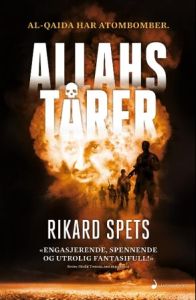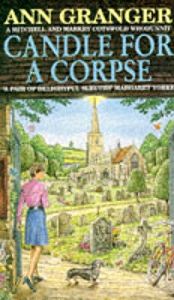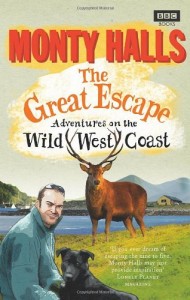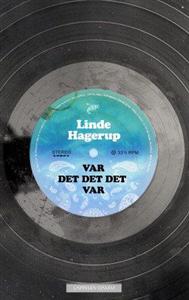 Noe av moroa med å være med i en boksirkel er at jeg ender med å lese bøker jeg ellers aldri ville lest. Allahs tårer av Rikard Spets er et godt eksempel, dette er en bok jeg sannsynligvis ikke ville plukket opp for å lese vaskeseddelen til en gang, langt mindre gitt med i kast med.
Noe av moroa med å være med i en boksirkel er at jeg ender med å lese bøker jeg ellers aldri ville lest. Allahs tårer av Rikard Spets er et godt eksempel, dette er en bok jeg sannsynligvis ikke ville plukket opp for å lese vaskeseddelen til en gang, langt mindre gitt med i kast med.
Men lese den gjorde jeg, og det var slett ikke så dumt.
Spets er debutant, men har fått gode anmeldelser, så vidt jeg har forstått. Nå er dette ikke en genre jeg egentlig har noe godt sammenligningsgrunnlag for – det nærmeste jeg kommer er vel gjennompløyning av Alister MacLean i ungdommen og enkelte av Jeffrey Archer sine bøker. Så om Spets er bedre eller dårligere enn det meste som gis ut i «spenningsroman»-klassen, det skal jeg ikke uttale meg om. At historien derimot var engasjerende, og at jeg etterhvert satt (metaforisk) på kanten av setet og ikke ville legge boken fra meg, det kan jeg jo si.
Vi hadde riktignok en litt shaky start, Spets og jeg. Det begynte med at han kaller kamelens føtter for «poter». Etter litt faktasjekk må jeg gi ham rett i at det nok er et tillatt ord å bruke, men jeg ville virkelig ikke valgt det selv, for det høres rett og slett feil ut. Nåja. Etter det ble jeg ekstra oppmerksom på språket. Når jeg kom til side 70 ble jeg svært bekymret, for da kunne jeg lese: «Den slanke kvinnen som steppet ut av teltet (…)». Teltet i ørkenen, altså. Jeg vet ikke med deg, men jeg har faktisk prøvd stepping en gang i hine håde dager, og jeg kan forsikre deg om at man nok må være på Fred Astaire sitt nivå for å klare å steppe i ørkenen. Faktisk tror jeg selv den godeste Fred måtte ha juksa litt for å få til noe særlig med lyd.
Heldigvis ble det ikke noe særlig verre enn det, et feilpekende pronomen to sider senere forårsaket av en innskutt setning, og en anglisisme til på side 98 («Hvis dere ser hit, kan dere se hvordan de gjør det.» Altså «how they are doing», ikke hvordan de utfører bragden. Det burde vel stått «hvordan det går med dem» eller noe slikt) er det siste jeg noterte meg, og etter det var det enten ingen flere språklige finurligheter, eller så ble jeg så engasjert i historien at jeg sluttet å legge merke til dem. Begge deler er akseptabelt (men man kan jo håpe på det første).
Så altså: Jeg likte i grunnen boka godt, for det den er, en drivende god spenningshistorie. Spets har skapt en likandes helt i Angus Storm, og jeg kan vel få si at det ligger an til å kunne komme flere bøker uten at jeg røper for mye om handlingen i boka (det ville forsåvidt vært et orginalt grep å la jorda gå under på slutten, men det hadde vel ikke helt stemt med genren, «de gode» skal tross alt helst «vinne» til slutt). Det er også en hel rekke småinteressante bipersoner, en haug våpenteknisk prat (som jeg tar for god fisk, eller egentlig ikke bryr meg om ikke stemmer, det hørtes plausibelt ut) og en del skildringer av krigens realiteter som desverre er realistiske så det holder selv om man kunne øsnke at det var rent oppspinn og at slikt ikke skjer i den virkelig verden. Mot slutten er det et halvhjertet forsøk på å innføre en «romantisk interest», her følte jeg at det enten kunne vært gjort mer ut av det eller vært droppet helt, som det er ble det en litt meningsløs løs tråd, men det var jo dette med en potensiell oppfølger. Vi får se.
Allahs tårer anbefales dermed, selv om du ikke normalt leser spenningsromaner du heller.








